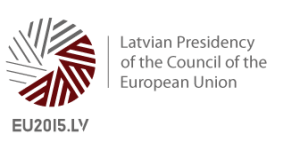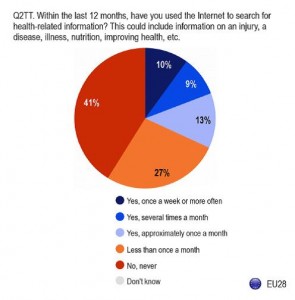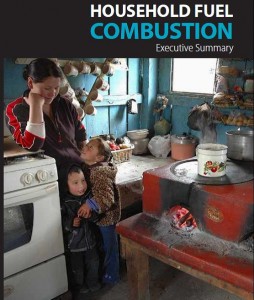European Commission structural changes affecting public health
The new European Commission has started its work as from the 1st November launching the final decision on the organisation of responsibilities of the Members of the Commission. According to this decision, the Directorate General Health and Consumers (SANCO) will be led by the Health and Food Safety Commissioner, Vytenis Andriukaitis, who will be responsible for relations with:
- The Community Plant Variety Office (CPVO)
- The European Centre for Disease Prevention and Control (ECDCPC)
- The European Food Safety Authority (EFSA)
- The European Medicines Agency (EMA)
The changes for DG SANCO are:
- The Unit responsible for Health Technology and Cosmetics moves to DG Enterprise and Industry (ENTR)
- The Directorate of Consumer Affairs moves to DG Justice (JUST)
- The Food waste and biocides unite were moved from DG Environment (ENV) to DG SANCO.
Health priorities in 2015 - Latvian Presidency of the EU
During the first half of 2015, Latvia will take over the Presidency of the European Union Council from Italy. The presidency is responsible for driving forward the Council’s work on EU legislation, ensuring the continuity of the EU agenda and cooperation among the Members. Among other priorities, in the field of health the upcoming Presidency is planning to: 
- reach an agreement with the European Parliament on the proposal for Regulations on medical devices;
- reach a general approach on the Regulation on psychoactive substances;
Continue discussions on healthy lifestyle:
- facilitate the discussions on the future of the alcohol policy in the EU;
- emphasize the importance of patient centred health care;
- highlight the importance of multidrug-resistant tuberculosis.
Public Consultation on Guidelines relating to the provision of food information to consumers
The European Commission has launched a public consultation on the Guidelines relating to the provision of information on substances or products causing allergies or intolerances as listed in Annex II of Regulation (EU) No 1169/2011 on the provision of food information to consumers. The guidelines aimed to facilitate the implementation of the upcoming EU regulation on food information to consumers. We invite all interested individuals and stakeholders to take part in the consultation to ensure that the interests of allergic consumers are explicitly taken into consideration. The consultation is open until January 4, 2015.
Report on the event “Eating safely: round table on European best practices on allergens labelling”
On the 24th September EFA in collaboration with the European Academy of Allergy and Clinical Immunology (EAACI) organised an event “Eating safely: round table on European best practices on allergens labelling” hosted by the Member of the European Parliament (MEP) Renate Sommer (EPP, Germany). To resume the event’s outcome EFA has recently published the report on it, where you will find brief summaries of each presentation, as well as policy recommendations and useful links to the best practices on allergens labelling in Europe.
World Health Organisation’s new guidelines on Indoor Air Quality (IAQ)
We use energy at home for a many purposes: from cooking to entertainment. However, all home energy can impact our health in a variety of ways. The most important direct health risk is household air pollution caused by the incomplete combustion of fuel in low-efficiency stoves and lamps used for cooking, heating and lighting. Only in 2012, 4.3 million people worldwide and 117 000 in the European region died prematurely due to household air pollution and currently nearly 3 billion people still do not have access to clean fuels and technology for cooking.
The new WHO Indoor Air Quality guidelines emphasize the need to improve access to cleaner home energy sources, particularly in low- and middle-income countries. Meeting new emission targets means that some 90% of homes globally will meet WHO’s air quality guideline values. According to WHO, clean, sustainable sources of household fuel have an important role in climate change mitigation especially by reducing substantial carbon dioxide (CO2) emissions. WHO recommends that governments and other agencies developing and implementing policy on mitigating climate change consider action on household energy, and make assessments to maximize health and climate gains. In addition, clean technologies and fuels must be affordable by the lowest-income households. Furthermore, WHO is planning to intensify its support to Member States that develop their policies independently from European Union (EU) processes. Whereas indoor air pollution is considered as a more serious threat to the low-income countries, it is important to take into consideration that household-fuel combustion also contributes to outdoor air pollution which was responsible for over 482,000 deaths in Europe in 2012. Deaths from outdoor air pollution occur in all European countries regardless of income.
Antibiotic Awareness Day
On the 18th of November, Europe celebrated the Antibiotic Awareness Day. To remind Europeans about the dangers of inappropriate and unreasonable use of antibiotics, the European Centre for Diseases Prevention and Control (ECDC) has developed a toolkit offering an advice on the promotion of responsible antibiotics use. For some diseases, antibiotics is a must, however, before taking them, it is important to remember that:
- It is crucial to follow the advice of the doctor;
- Antibiotics are effective only against bacterial infections, they will not help you in case of a common cold or flu;
- Antibiotics do not prevent viruses from spreading to other people;
- Misuse of antibiotics makes bacteria resistant to antibiotic treatment, so if you use them for something else, the day you will truly need them, they may no longer work. For this reason, Europe might dace a return to pre-antibiotic era, where common bacterial infection such as pneumonia would be lethal.
Access to healthcare in times of crisis
Prompted by the economic and financial crisis, many European governments have cut spending in healthcare services leading to significant differences in healthcare systems between EU Member States. According to a new report published by the European Foundation for the Improvement of Living and Working Conditions (Eurofound), unemployment, financial problems and reduced prevention have increased the need for certain healthcare services, while a reduced income resulted in the emergence of new groups that were not considered vulnerable previously. The report presents real life examples and states that policymakers and service providers need to review their crisis responses when financial pressures on EU Member States begin to ease. Eurofound recommends investing in better working conditions of healthcare professionals, as well as in technologies, self-help facilities, home and ambulatory care.
European citizens’ digital health literacy
eHealth has the potential to empower citizens to better manage their health and disease, improve prevention, enable more accurate diagnosis and treatment and facilitate the communication between healthcare professionals and patients. One of the core objectives of the European Union is to improve the health of European citizens. The eHealth Action Plan 2012-2020 identified the lack of awareness of eHealth opportunities and challenges for users as one of the barriers to wider uptake of eHealth solutions and proposed to support activities aiming at increasing citizens’ digital health literacy.  The new report “European citizens’ digital health literacy” published by Eurobarometer was aimed to assess the extent to which Europeans already use the Internet and online resources to help manage their own health, and the results show that Europeans become more enthusiastic about online health information:
The new report “European citizens’ digital health literacy” published by Eurobarometer was aimed to assess the extent to which Europeans already use the Internet and online resources to help manage their own health, and the results show that Europeans become more enthusiastic about online health information:
- Over 75% think the Internet is a good way of finding out more about health;
- 6 out of 10 Europeans go online when looking for health information;
- 90% of those said that the Internet helped them to improve their knowledge about health-related topics;
- When online, people are searching for health-related topics or to improve their lifestyle choices such as nutrition, physical activity, smoking etc.
- 8 out of 10 surveyed said the information they found was useful;
- 4 out of 10 people do not think the information came from a trustworthy source;
However, the study has also identified some gaps between EU Member States: people in the Netherlands (73%), Sweden (70%) and Denmark (70%) are more likely to use the Internet for health information during the past year, while on Romania (47%) and Malta (49%) less than half of the population uses the Internet for this purpose.
eSkills and Health Workforce
To provide a better understanding of various factors that impact eSkills development and needs in EU workforce, the comprehensive eHealth Stakeholder Group (eHSG) has contributed to the publishing of the eSkills Workforce report. The report outlines the current challenges faced within the healthcare systems in the EU and the existing innovative models of healthcare delivery through the use of ICT and the related eSkills gap of health professionals required for delivering and deploying eHealth services effectively. Furthermore, the report provides recommendations on feasible actions at both national and European levels to address the identified challenges.
Outcomes of the 17th European Health Forum Gastein
The European Health Forum Gastein held in October hosted animated discussions among more than 600 health professionals. EFA was represented by EFA President Breda Flood and the EU Policy Adviser Roberta Savli. The Forum reviewed underlying demographic, social, scientific, economic, environmental issues affecting the European healthcare. Thus, it is possible to highlight the following priorities in the field of health drawn by conclusions of the Forum: (1) a renewed attachment to health in all policies and a better coordination between social and health policy; (2) a shift from short-term to long-term thinking about the health, with a strong emphasis on the prevention; (3) patient must have a priority in health-related policies; (4) raising health system performance by introducing new tools and outcomes measurement; (5)European semester should include health investments and highlight how health contributes to the economic growth. EFA welcomes the highlighted priorities and hopes that those directions will be followed by the key policy-makers at the EU level.
EFA “Meet and Greet New European Parliament and Commission” Training Report
On the 13-14th of October an annual EFA training for members took place in Brussels to provide EFA members with a better knowledge of the structure, competencies and functioning of the newly elected European Parliament and the European Commission. Furthermore, participants got an overview of EFA’s collaboration with other stakeholders, our communication strategy and advocacy activities. For more information on the Meet and Greet training’s content and its evaluation, we invite you to read the report.
